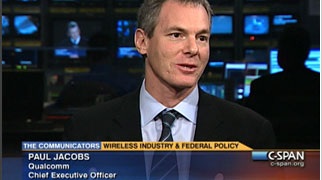Transparency and Application Efficiency Key To Wireless Net Neutrality Says Qualcomm Chief
Mobile phone network operators should provide incentives to application developers to increase the efficiency of their products so that wireless networks can be better managed, said Paul Jacobs, Qualcomm’s chairman and chief executive officer in an interview that aired on C-SPAN Saturday.

Mobile phone network operators should provide incentives to application developers to increase the efficiency of their products so that wireless networks can be better managed, said Paul Jacobs, wireless chip designer Qualcomm’s chairman and chief executive officer in an interview that aired on C-SPAN Saturday.
“There’s one really critical issue that’s associated with the net neutrality debate, which is the question of whether application developers are using the spectrum, or the bandwidth, efficiently,” noted Jacobs in a wide-ranging interview with Peter Slen of C-Span and Paul Kirby, senior editor at Telecommunications Reports.
“Today, to them, however much they use, it doesn’t really cost them anything,” Jacobs said of the creators of the applications that use the radio spectrum to transmit voice and multimedia data.
“You might look at, for example, a cellular operators who’s trying to be very efficient, who’s using 50 times less capacity to run a voice service than a Voice-Over-IP provider might. Yet under strict net neutrality rules, both services would have to be allowed to operate unimpeded,” he noted.
“There probably has to be some method to push back at the application developers to get them to be more efficient too,” he added.
One way of doing this would be to meter consumer access and to sell them packages that could show them how much bandwidth their applications are consuming, Jacobs said.
We believe that people should have access to whatever they want on the internet, but we think there needs to be some mechanism so that the consumer can understand whether they’re using a lot of bandwidth for this application or a little.
My analogy is to like a car gauge. I might know how much data I can use, like my gas gauge, so I know how much I have left, and something as well that tells me how much I’m using as in miles per gallon, so how much spectrum is being used at a given time.
This kind of metering system would have to be simple so that consumers wouldn’t get confused, Jacobs added.
“But that’s the notion — can we put in some transparency for the consumer as well as some measures that will cause application developers to be more efficient, and then allow the operators to price the way they want — allow tiers of service, different pricing and quality of service.
You may run out of your quality of service bucket at some point and things will degrade. That will only affect people who use really large amounts of spectrum — so that’s the way I look at net neutrality.
The reason that this kind of economic structure makes sense is that the incentive to become more efficient would come from the customers of the application developers, who would see which application is eating up all their minutes, Jacobs said.











Member discussion